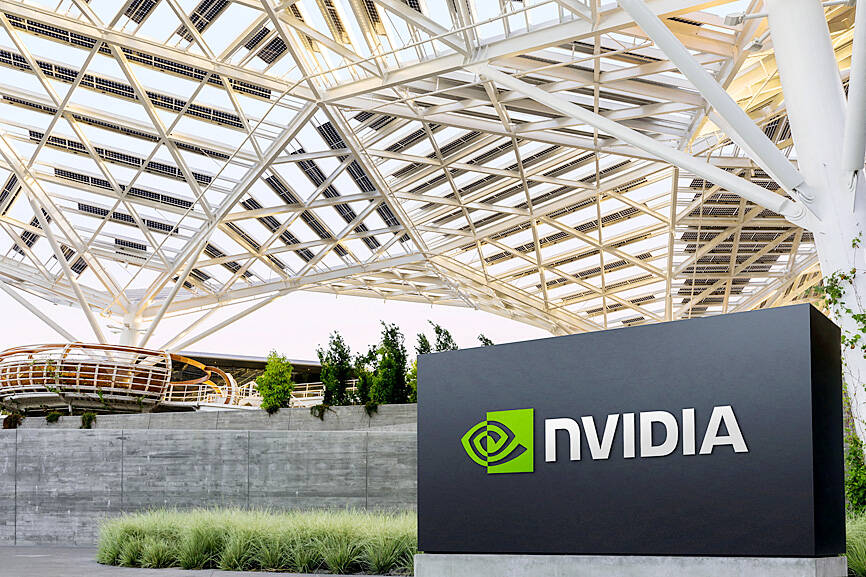Nvidia Corp became the largest company in the world on Tuesday, surpassing Apple Inc and underscoring just how dominant artificial intelligence (AI) has become on Wall Street.
Shares rose 2.9 percent to US$139.93, resulting in a market capitalization of US$3.43 trillion, ahead of Apple at US$3.38 trillion. Microsoft Corp, which Nvidia passed last month, has a market cap of US$3.06 trillion. Nvidia has soared more than 850 percent since the end of 2022.
“Over the past several quarters, it has felt like people basically care about inflation numbers, job numbers and Nvidia numbers,” said James Investment Research director of research Fall Ainina.

Photo courtesy of Nvidia
“Nvidia overtaking Apple in market cap not only conveys that it is the biggest beneficiary of the AI infrastructure cycle, but it suggests people expect the AI boom will continue,” Ainina said.
The chipmaker accounts for 7 percent of the weight of the S&P 500 Index and is responsible for about a quarter of the benchmark’s 21 percent gain this year. Nvidia previously closed with the title of largest company in June, although it only held the record for a day.
The biggest companies on Wall Street are all heavily exposed to AI: Apple with its newly launched AI iPhones; Microsoft, Amazon.com Inc and Alphabet Inc with their cloud businesses and AI services; and Meta Platforms Inc’s AI features and ad targeting. With the exception of Apple, these companies are all among Nvidia’s largest customers, and they have stressed their commitment to continuing to spend on AI.
Not only are the biggest companies by market cap AI plays, but so are the year’s top stock performers. Nvidia’s 183 percent advance is the third-largest in the S&P 500 this year, behind Vistra Corp — the power producer that has seen a surge in demand related to AI — and data-analysis software firm Palantir Technologies Inc.
“The implication of AI is extraordinarily large, and these big tech companies are investing hundreds of billions into it, with Nvidia benefiting the most,” Ainina said.
“Overall, there continues to be a good picture for its prospects,” Ainina added.

Vincent Wei led fellow Singaporean farmers around an empty Malaysian plot, laying out plans for a greenhouse and rows of leafy vegetables. What he pitched was not just space for crops, but a lifeline for growers struggling to make ends meet in a city-state with high prices and little vacant land. The future agriculture hub is part of a joint special economic zone launched last year by the two neighbors, expected to cost US$123 million and produce 10,000 tonnes of fresh produce annually. It is attracting Singaporean farmers with promises of cheaper land, labor and energy just over the border.

US actor Matthew McConaughey has filed recordings of his image and voice with US patent authorities to protect them from unauthorized usage by artificial intelligence (AI) platforms, a representative said earlier this week. Several video clips and audio recordings were registered by the commercial arm of the Just Keep Livin’ Foundation, a non-profit created by the Oscar-winning actor and his wife, Camila, according to the US Patent and Trademark Office database. Many artists are increasingly concerned about the uncontrolled use of their image via generative AI since the rollout of ChatGPT and other AI-powered tools. Several US states have adopted

A proposed billionaires’ tax in California has ignited a political uproar in Silicon Valley, with tech titans threatening to leave the state while California Governor Gavin Newsom of the Democratic Party maneuvers to defeat a levy that he fears would lead to an exodus of wealth. A technology mecca, California has more billionaires than any other US state — a few hundred, by some estimates. About half its personal income tax revenue, a financial backbone in the nearly US$350 billion budget, comes from the top 1 percent of earners. A large healthcare union is attempting to place a proposal before

KEEPING UP: The acquisition of a cleanroom in Taiwan would enable Micron to increase production in a market where demand continues to outpace supply, a Micron official said Micron Technology Inc has signed a letter of intent to buy a fabrication site in Taiwan from Powerchip Semiconductor Manufacturing Corp (力積電) for US$1.8 billion to expand its production of memory chips. Micron would take control of the P5 site in Miaoli County’s Tongluo Township (銅鑼) and plans to ramp up DRAM production in phases after the transaction closes in the second quarter, the company said in a statement on Saturday. The acquisition includes an existing 12 inch fab cleanroom of 27,871m2 and would further position Micron to address growing global demand for memory solutions, the company said. Micron expects the transaction to